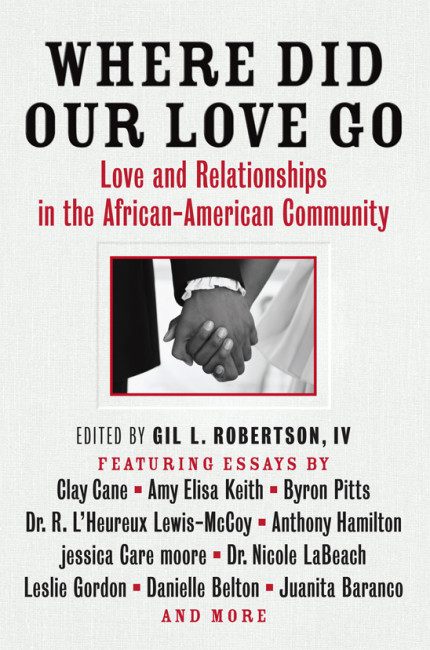Due to an avalanche of “Successful But Single Black Woman” news stories, celebrity-fueled talk show panels and the success of Steve Harvey’s book “Act Like A Lady, Think Like A Man,” there’s been buzz aplenty about the shrinking rate of black marriages and the exploding rate of black single-parent homes.
But instead of pointing fingers and making pariahs out of the opposite sex, journalist and author Gil Robertson hopes to inject some nuance into the debate with his latest anthology, Where Did Our Love Go: Love & Relationships In The African-American Community.
Using honest, yet optimistic essays, Where…has three parts (“Single,” “Married” and “Divorced”) and features a cross-section of citizens and celebrities opening up about past and present unions. Some are contemplative, such as entrepreneur’s Melody Guy’s passage, “Key Issues”, others are reassuring and reflective, like soul singer Anthony Hamilton’s “The Big Picture” and iconic entertainer Freda Payne’s post-divorce reflections detailed in “Patience, Sacrifice and Marriage.” The goal, according to Robertson, is to open dialogue and find solutions for the future.
“We all played a role into how we got here and now it’s time for us to collectively work to arrive at a new place,” he said during a recent phone conversation from Atlanta. “Like my other collections (Not In My Family: AIDS In The African-American Community and Family Affair, What It Means To Be African-American Today), the goal is to encourage discussions that will inspire and motivate people to change or look at a different approach.”
In finding sources for the book, Robertson sought a variety of age groups and perspectives. “We’re not a monolith and we have different voices, opinions and histories. If you’re going to cover the subject of ‘black love’ comprehensively, it’s important that you get all of those voices on board so that you can fully understand [the complexity of] the subject.”
That even-handed approach has been lacking in a couple of recent best-sellers, thanks to authors that seem to diminish the culpability of black men while over-emphasizing the efforts that black women should make in today’s relationships.
“It’s one of the most disappointing parts of this conversation, the failure of black men to stand up and be accounted for. What are we going to do as productive husbands and fathers to really contribute to the relationship? Sisters have long championed and been the backbone for black love, black family and the black community, so the question then becomes, ‘When are we going to step up and realize the potential of who we are as black men?'”
The statistics are sobering: 42 percent of black women between the ages of 25-34 are unmarried and 68 percent of black children are being raised in single parent households. We are still ‘jumping the broom,’ but black men are three times as likely to marry outside the race than black women are. Those trends, Robertson said, are indicative of perpetual negative stereotyping and a misguided sense of ‘multiculturalism.’
“Society has sent a message that they don’t value women of color, particularly women of African descent, so if you have a weak mind, you’re susceptible to [those messages],” he said. “I think it’s important that we raise our children with more balance and a greater emphasis on our racial and cultural signature within this notion of the ‘melting pot.’ It’s not racist to gravitate to people like yourself or to embrace them more, that’s part of who we are as a species. It’s time for us to adapt a different paradigm as far as what we’re teaching our kids about status and race.”
Where Did Our Love Go? doesn’t pretend to have all of the answers, but it does help readers to seek the right questions. “Marriage was started for a reason, a social construct transferring wealth and maintaining a standard of living for the families involved,” Robertson said. “It plays a role that is too central to our well-being as a culture for blacks to take it so lightly.”






2 Comments
Enjoyed reading this, very good stuff, regards . “Curiosity killed the cat, but for a while I was a suspect.” by Steven Wright.
June 8, 2014 at 1:22 pmI tend not to leave a lot of comments, but i did some searching and wound
March 4, 2014 at 6:30 amup here Poignant And Provocative, New Book
Asks Blacks